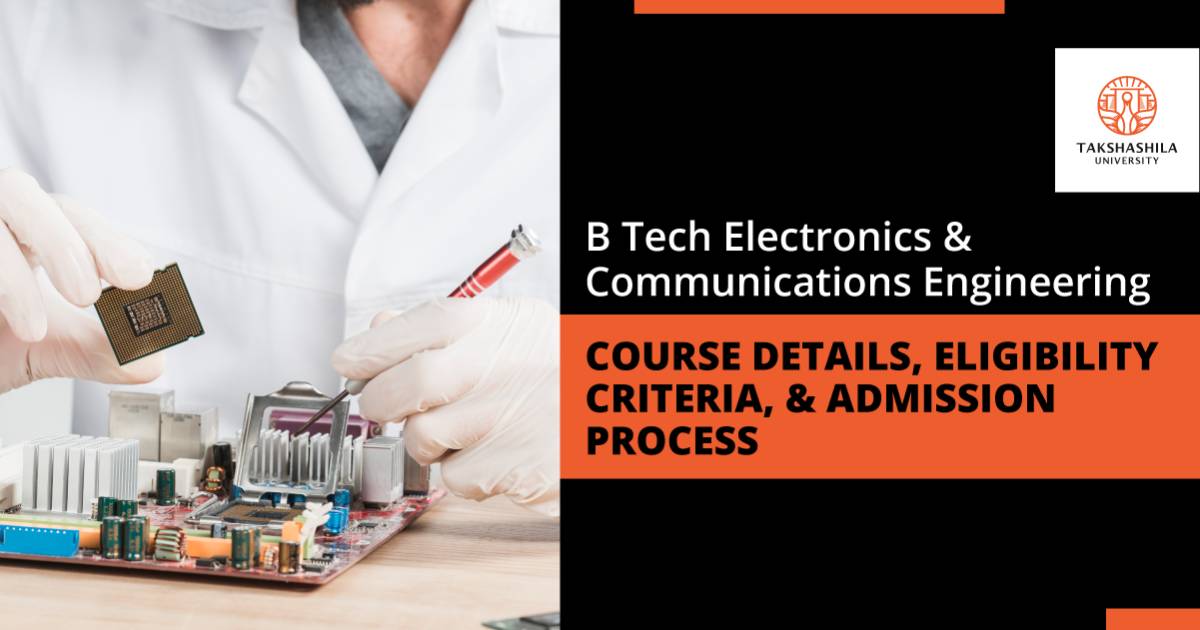The B Tech in Electronics & Communications Engineering (ECE) is an advanced degree course that combines the concepts and principles of electronics and modern communication technologies.
This field is critical in today’s technology-oriented world as it covers a wide range of areas, from telecom engineering to signal engineering. To provide this information, the article highlights the B Tech ECE program, its core subjects, curriculum highlights, eligibility criteria, and the admission process.
We will also touch upon the various employment avenues and the salary available to the graduates.
This article will make you more knowledgeable on B Tech in Electronics and Communications Engineering and the career options it presents for you in this field.
Let’s get started without any further ado!
Who Is Opting To Pursue A BTech In Electronics And Telecommunication Engineering?
Pursuing a Bachelor of Technology (B.Tech) in Electronics and Telecommunication Engineering is an excellent choice for individuals interested in electronics, communication systems, and technology innovation.
This degree is well suited for people with a good background in mathematics and physics as these subjects are essential in analysing the theories behind electronic circuits, signal processing and communication.
Furthermore, the trend in this field is constantly on the rise around the globe due to emerging technology and transportation reliance on telecommunications daily. Thus, it is a wise decision from the occupier’s point of view.
In addition to this, an Electronics and Telecommunication Engineering degree offers students enormous employment opportunities in numerous industries, including telecommunications, consumer electronics, aerospace, information technology, and many others. Students can be employed as systems analysts, researchers and developers, system designers, network administrators, project managers, and many others.
The curriculum usually involves combining the specified theoretical knowledge with practical experience to help students solve problems. Further, as industries progress toward incorporating new technologies like IoTs, 5G, and artificial intelligence, the importance of having this degree is boosted.
To learn more details, stay curious and keep reading!
Program Overview: Fusing Of Electronics And Communication
B Tech in Electronics And Telecommunication Engineering
Program duration: Generally done in 4 years (8 semesters).
Curricular emphasis: Merging the study of electronics with new developments in communication, electronic circuits, communications systems, and signal processing are some of the areas taught.
Essential skills acquired: System design of circuits, system analysis and development of communication system, signal processing, and system design.
Core Subjects And Skills
Core Subjects
- Electronic Circuits: Theory and practical study of both analogue and digital electronics output circuitry, including but not limited to amplifiers and oscillators circuitry.
- Communication Systems: Research different communication methods, including radio communication, satellite communication, etc.
- Signal Processing: This aspect concerns the operation that requires so much effort and focuses on enhancing the performance of a given system.
- Microprocessors: Basic guidelines of a system for microprocessors and the system’s working.
Skills Acquired
- Technical Proficiency: Amplification in designing and investigating electronics and communication systems.
- Problem-Solving: Management of complex issues concerning electronics and communicational technology.
- System Integration: Can combine various units to form an operational communication system.
Additional Skills
- Circuit Design: Development, construction and review of circuits appropriate for use.
- Communication Protocols: Knowledge of the accepted procedures which govern communications
- Advanced Technologies: Familiarity with new inventions in the electronics and communication world.
Eligibility Criteria: Who Can Apply?
Educational Qualification
Completion of Higher Secondary Education (10+2): Students qualifying for this must have taken Physics, Maths and Chemistry as the subjects.
Minimum Marks
Typical: 50 to 60% constituting Physics, Mathematics and Chemistry.
Entrance Exams
- JEE Main: This is a standard syllabus test for students pursuing engineering courses.
- BITSAT: Eligibility exam is done for prospective students who wish to join BITS campuses.
- State-Level Exams: Economical structure engineering entrance exams are conducted in many states.
Admission Process: Steps To Enroll
Here is the process you need to know to proceed with the admission process,
- Research and Apply: Look for institutions offering B Tech ECE and complete their applications online.
- Entrance Exam: Study for all the specified entrance exams and do those exams.
- Document Submission: Submit the results of the entrance exams and the accumulated academic results.
- Counselling and Admission: There is a counselling meeting whereby one chooses what they want to study, and instances of admission are made.
Reasons For Pursuing BTech In Electronics & Communications Engineering
- Integration of Electronics And Communication
Consolidate electronics knowledge with various communication technologies, among the principal tools of today’s industries.
- Industry Demand
Cater for the increasing demand for personnel with good knowledge of electronics and communication.
- Advanced Projects
Chance to participate in extraordinary telecommunication, signal processing and electronic systems projects.
Career Opportunities: Future Prospects
If you pursue B Tech in Electronics & Communications Engineering, you can get any of these opportunities with a paying salary,
- Potential Careers: Electronics Engineer: Create and construct electronic systems and devices.
- Communication Systems Engineer: Responsible for the planning and administration of communication systems.
- Signal Processing Engineer: Focus on methods for signal analysis and manipulation.
- Systems Integration Engineer: Combine different communication and electronic systems.
Job Sectors
You must ascertain which industry you can readily obtain work experience in before enrolling in the B Tech in Electronics & Communications Engineering. Here are a few examples.
- Telecommunications: Employment in companies that provide communications services.
- Electronics Manufacturing: Specialization in the design and manufacture of electronic equipment.
- Information Technology: Involve in IT-related products and services.
- Research and Development: Engagement in research activities about advanced devices.
Application Tips: How to Stand Out Resume Building
Focus on individual coursework and projects. Add internships or any other hands-on experience in electronics and communication.
Technical and problem-solving abilities are mentioned in the interview preparation as significant skills.
Anticipate queries from the ever-changing trends in electronics and communication technology.
Industry Trends: What to Expect Emerging Technologies
Here are some of the new technologies if you are seriously going to B Tech in Electronics & Communications Engineering as your career,
- 5G Networks: The development and deployment of 5G technology are here, and their impact is everywhere. IoT (Internet of Things): The development of increasingly interconnected systems dominates communication.
- Cybersecurity: The application of security methods in the communication network and Information storage is of greater significance.
- Future Developments: Progress in artificial intelligence and how it relates to the design and practice of electronics and communications. Creation of a new set of communication standards along with new systematic proposals.
Skill Enhancement: Beyond The Curriculum
Certifications
- Certified Electronics Technician (CET): Augmented knowledge of electronic systems troubleshooting.
- Certification-approved communication Network Engineer (CCNE): Deployment includes, but is not limited to, managing advanced communication networks.
- Certified Signal Processing Specialist (CSPS): Technical measures used to process signals for practical usage.
Workshops And Seminars
Attend industry workshops and seminars and enhance your understanding of the most temperate technologies. B ring to test the theoretical knowledge and ability to conceptualise practical scenarios by participating in hackathons and coding contests.
Hands-On Experience
Lab Work: Conduct lab work to provide a working knowledge of practical lessons learnt in class.
Internships: Find opportunities in the organisation to undertake real work and earn experience.
Financial Considerations and ROI
Cost of Education
Tuition Fees: The average fee structure for B Tech in Electronics & Communications Engineering courses is about one lakh rupees to twenty-five lakh rupees per annum in most educational institutions. This depends on the institution; at some universities, such specialised programs or facilities may cost more than others.
Other costs: In addition to tuition fees, students must also consider their budget for books, materials, and housing. Such additional costs could approximately cover rupees twenty thousand to fifty thousand per year, depending on the site of learning and personal spending habits.
Return on Investment (ROI)
High ROI: A very high return on investment is experienced after pursuing a B. Tech in Electronics & Communications Engineering. Expectations are that salaries earned are commensurate with the investment in education since these provide decent returns.
Job Opportunities and Market Growth: Opportunities abound for these graduates due to the growing need for specialists in electronics and communications, which further stretches their job prospects. This adds to the positive ROI as the graduates are likely to benefit from their investment in education through the increased abundance of job opportunities.
Pursuing a B Tech degree in Electronics and communications Engineering is more than just an education; instead, it becomes a calculated effort in a highly sought-after profession. The expenses and potential income an individual can generate will always persuade one to pursue the most favourable prospects.
Join Takshashila University Today!
If you have learned a lot and want to advance in your engineering career, you should join the Takshashila University B Tech in Electronics & Communications Engineering program.
Our program, therefore, provides an all-round education, professional training and good placement to enhance success.
Visit the official admission page for more information on how to apply Today. Click to visit Instagram for more information, fresh news, and tips on how you can improve your educational process and future career.
Conclusion
The B Tech Electronics & Communications Engineering provides a strong groundwork for electronics and communication disciplines.
Thus, having a theoretical and practical curriculum, students are all set to participate in a versatile and developing sphere.
The skills and knowledge acquired in this program contribute to the various jobs carried out within electronics engineering and communication system management.
In detail, regarding the course offerings, requirements for admission, and the admission procedure, prospective students can be in a better position to make proper decisions. As they graduate, this program guarantees the students students and ensures that they get the right tools for a career in this ever-growing field.






